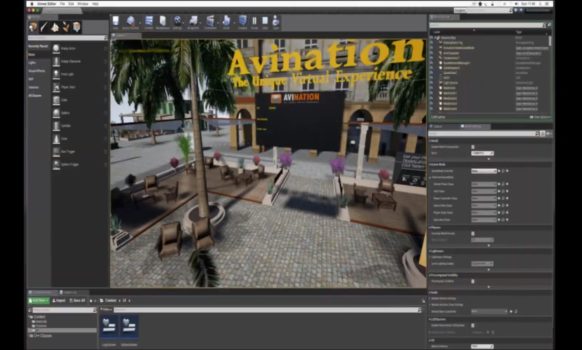
The 2018 OpenSim Community Conference. started off with a bang this morning with an announcement of a new virtual reality viewer for OpenSim.

OpenSimulator core developer Melanie Thielker — also known as Melanie Milland in-world — announced that she is releasing her virtual reality OpenSim viewer to the open source community, available here via GitHub.
The new viewer uses the Unreal Engine to display OpenSim regions, such as areas from the grid Thielker founded, Avination.
“We were actually able to walk through those sims with a VR headset on,” she said. “It changed my whole view of the world. I’ve been in virtual worlds for a long time but actually walking through Avination was a new dimension for me. It was like coming home.”
The Unreal Engine gives a new, fresh look to OpenSim regions, she said. The lighting is also better, with real shadow effects.
“The Linden Lab viewer never looked so good,” she said.
Currently, OpenSim regions can only be visited using viewers build on the Linden Lab code base, such as the popular Firestorm viewer.
To be visited in virtual reality with Thielker’s new viewer, the OpenSim regions first have to be converted to a format compatible with the Unreal Engine. There is no support yet for getting the regions directly from OpenSim servers, or for having avatars in the scene.
“This is meant to eventually load the scene from a live server, but the network stack isn’t done yet,” she said. “It’s not yet functioning, but someone can take the ball and run with it.”
Rendering the scenes in VR was the hard part, she added. For example, she said, her team had to port Meshmerizer to C++, a tool that converts the prims used by OpenSim to mesh objects that can be imported into Unreal Engine.
“We were already using Meshmerizer in OpenSimulator in order to have the prims be meshes for physics,” she said. “Now we are using it for display.”
Unreal Engine is free for developers and non-commercial projects. The new OpenSim viewer code will be made available for free on GitHub, she said.

Can be ready ‘in months’
According to Thielker, a team of developers should be able to have a viable viewer in a few months.
“We did the heavy lifting for getting it to actually display,” she said.
There will be a panel later today in which OpenSim developers will be discussing this and other topics, but one OpenSim developer was in the audience for Thielker’s presentation and expressed interest.

“I think we all found our new project,” said Crista Lopes, a professor at University of California, OpenSim core developer, and the inventor of the hypergrid.
In addition to lacking a user interface, the new viewer will also not solve the problem of a missing Web viewer for OpenSim, since Unreal Engine doesn’t support web viewing.
New web technologies like WebGL and HTML 5 do allow for the creation of websites that work well both on standard displays and in virtual reality headsets. Other virtual world projects, such as SineSpace, can be accessed via both the web and via VR headsets.
“We did some work on having a user interface that is HTML5, but it turns out that it breaks the VR,” Thielker said. “But the richness of content in OpenSim has been prohibitive for doing it on the Web, anyway.”
Watch Melanie Thielker’s presentation in this video.
- OSCC 2024 Submission Deadline Approaching - October 19, 2024
- AvatarLife Viewer adds video calls, screen sharing - October 19, 2024
- Spooky season brings more visitors to OpenSim worlds - October 15, 2024
